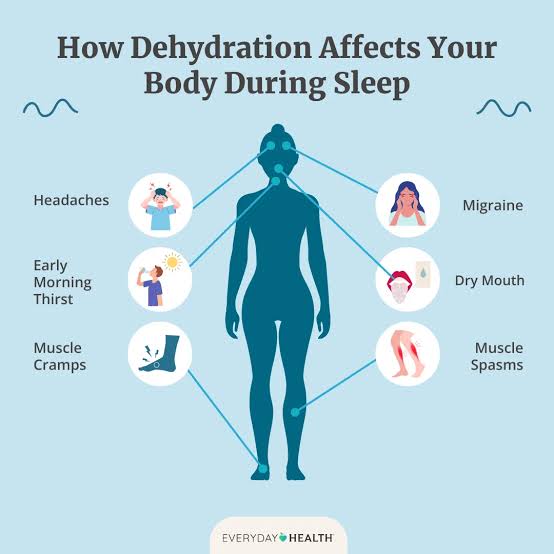
Waking up in the middle of the night feeling thirsty is a common issue, but when it happens often, it can affect sleep quality and overall health. Understanding the causes of thirst during sleep can help you take the right steps to stay hydrated and improve rest.
Why Do You Feel Thirsty at Night?
Thirst during sleep is usually linked to dehydration or lifestyle habits, but sometimes it can be a symptom of an underlying health condition. Below are the most common reasons
Dehydration
Not drinking enough water during the day can cause nighttime thirst. If your body doesn’t have enough fluids, you’ll naturally wake up needing water.
2. Dry Mouth (Xerostomia)
Sleeping with your mouth open, snoring, or having nasal congestion can reduce saliva production and make your mouth dry, leading to thirst.
3. High Salt Intake Before Bed
Eating salty snacks or heavy dinners can increase sodium levels in the body, triggering thirst while you sleep.
Hot or Dry Bedroom Environment
Sleeping in a hot room, especially with low humidity, can make you lose fluids through sweat and breathing, causing thirst.
5. Medical Conditions
Some health issues can lead to frequent thirst at night:
Diabetes (Type 1 or Type 2) – Excess sugar in the blood makes the body lose fluids, leading to dehydration.
Diabetes Insipidus – A rare condition where the body cannot balance fluid levels properly.
Kidney problems – May affect the body’s ability to regulate hydration.
Medications
Certain medications, such as diuretics, antidepressants, or antihistamines, can cause dry mouth and increase thirst.
7. Alcohol or Caffeine Consumption
Both alcohol and caffeine act as diuretics, making your body lose fluids and leading to increased thirst at night.
How to Prevent Thirst During Sleep
If you often wake up thirsty, these simple tips may help:
Stay hydrated during the day: Drink enough water regularly, not just before bedtime.
Limit salty foods at night: Avoid heavy, salty dinners or snacks close to bedtime.
Control room temperature: Keep your bedroom cool and use a humidifier if the air is too dry.
Reduce alcohol and caffeine: Especially in the evening.
Breathe through your nose: If you snore or have nasal issues, consult a doctor.
When to See a Doctor
Occasional thirst during sleep is normal, but if it happens frequently and is accompanied by excessive urination, fatigue, or unexplained weight changes, consult a healthcare professional. It may indicate diabetes or another medical condition.
Final Thoughts
Waking up thirsty at night can be caused by something as simple as not drinking enough water—or it could be linked to an underlying health issue. By adjusting your hydration habits, diet, and sleep environment, you can improve sleep quality and overall well-being.






